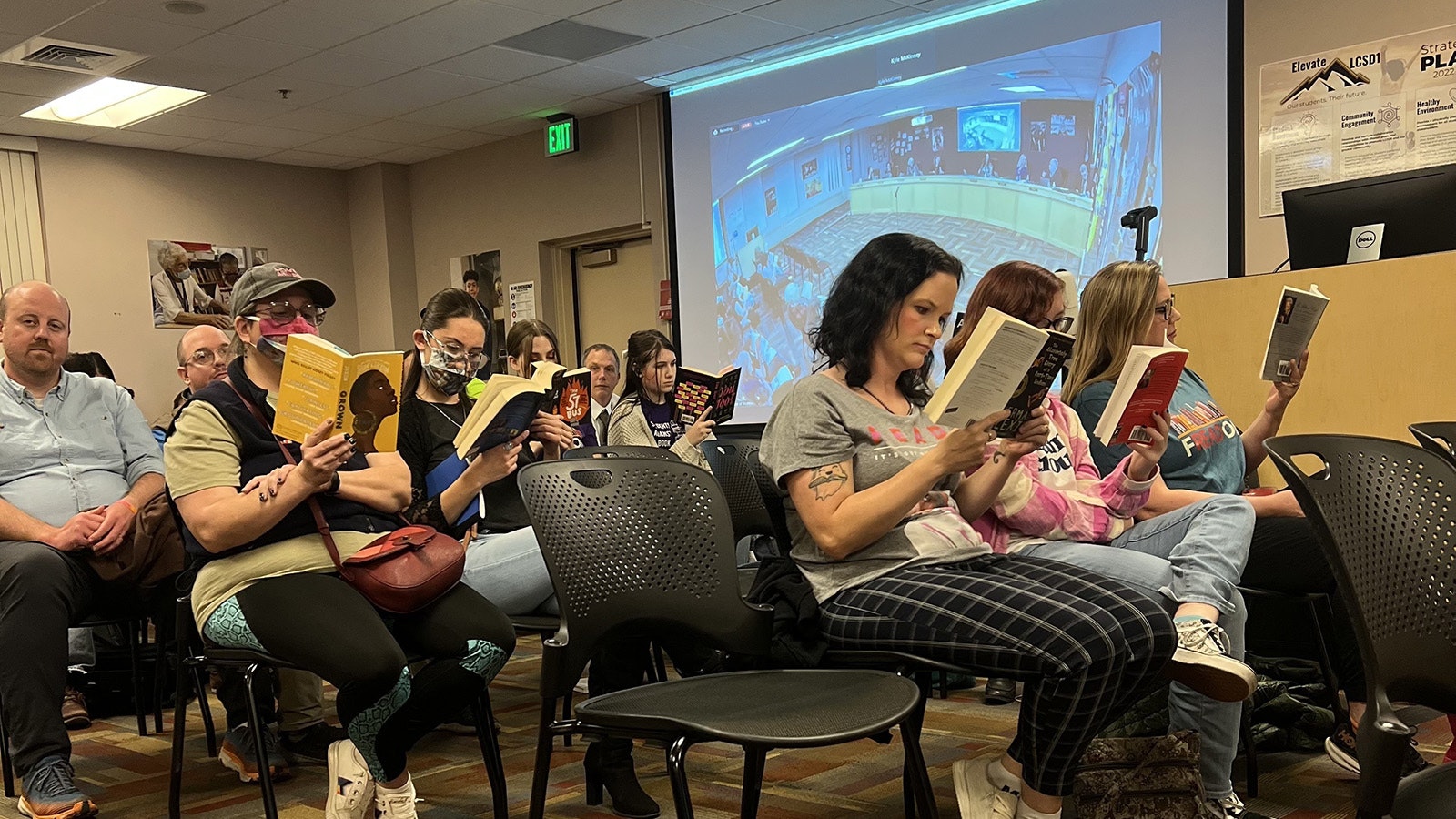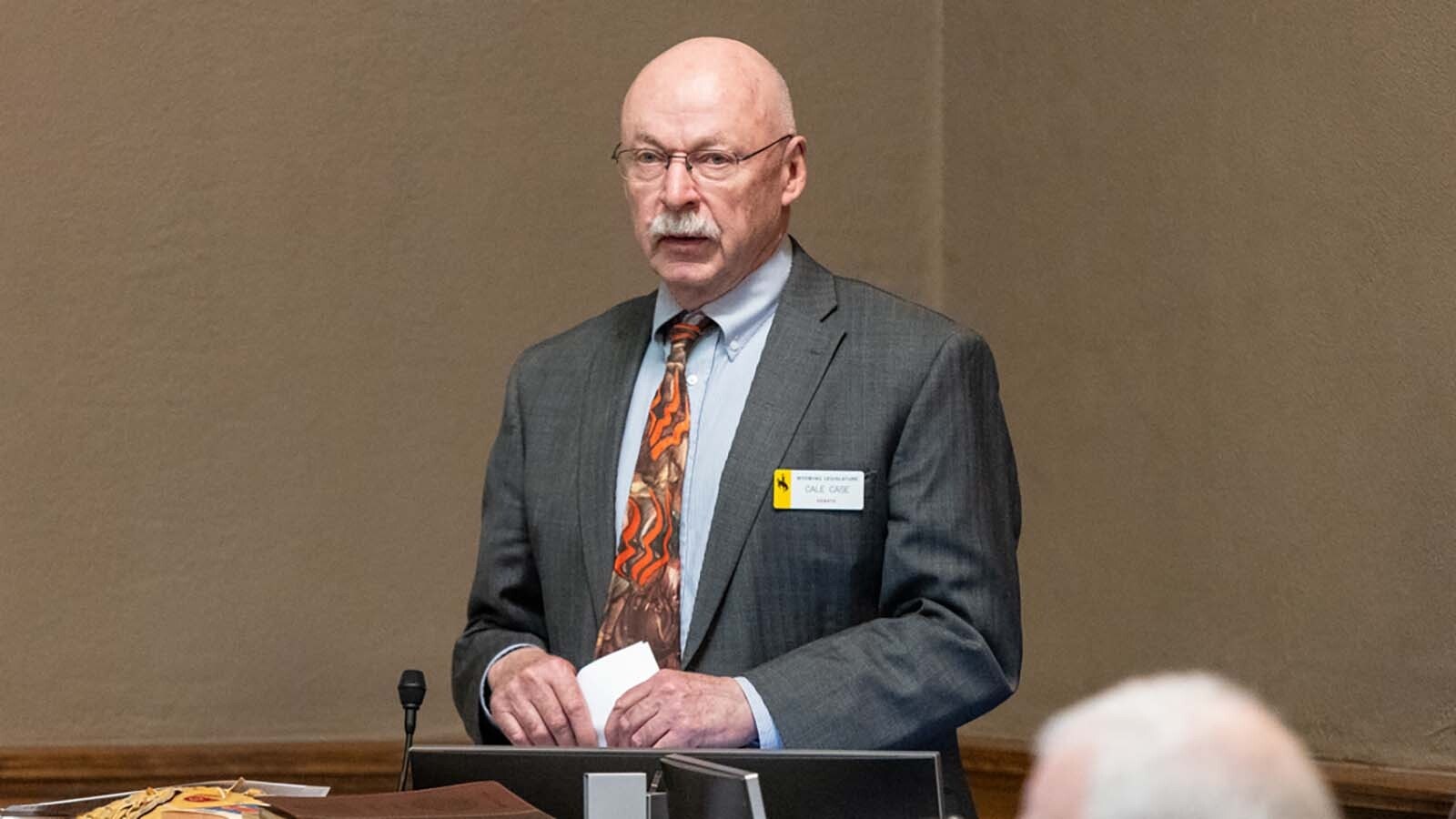CHEYENNE — Down the aisles and through the rows, many of those at the Laramie School District #1 Board of Trustees meeting Monday didn’t seem to be paying any attention. That’s because their heads were buried in books — controversial books that have been singled out by some on the board as potentially not fit to be in district libraries.
The book readers, making up nearly half of those in attendance at the meeting, were there in a form of silent protest against recent efforts to deal with certain books viewed as sexually explicit or obscene for underage readers of the school district.
“We’re here to remind them that people are free to read freely,” said Meg Varhalmi.
LCSD1 is in the process of taking public comments on a proposed new policy that will remove the district’s current “opt-out” policy and replace it with an “opt-in” policy for checking out certain books from school libraries.
Some of the books that have been brought up aren’t in circulation in the school district.
Scrutinization of books in school and public libraries has been growing across the nation and Wyoming, including becoming a major education issue for conservatives. A number of other Wyoming school districts over the past year have discussed and/or adopted policies directed at library materials with strong sexual themes and content.
During a Hot Springs County Democratic Party-hosted panel last week, former Wyoming Library Association President Conrrado Saldivar cited a recent American Library Association report that found a 20% increase in the amount of materials challenged in school libraries this year.

What Were They Reading?
Varhalmi’s daughter Aerin Varhalmi was reading “A Court of Mist and Fury” by Sarah J. Maas, which has been criticized by some for its sexual content and because the protagonist is involved in an abusive romantic relationship. In 2022, a Virginia judge ruled that the book is too obscene for unrestricted viewing by minors.
Meg Varhalmi was reading “Grown” by Tiffany Jackson, a book that openly explores rape and sexual assault.
Many people who have advocated for more restrictions on some books accessible to children in school libraries argue for parental choice.
Meg Varhalmi said she and others at Monday’s meeting feel that actually restricts parental choice by requiring them to opt-in their children to check out books from the school district they support with their taxes.
Varhalmi said she thinks the LCSD1 board does not represent a majority view of people in the school district and promises more civil protest, but the majority of the board has shown support for the proposed policy.
Not one of the book readers spoke during the two public comment periods at Monday’s meeting. Although the board never directly acknowledged them, Board of Trustees Chairman Tim Bolin made a comment that it was the first time in three years that they hadn’t had a public comment.
“When you don’t protest they think they’re in a bubble,” Meg Varhalmi said. “It’s a way of telling them the majority doesn’t actually agree with restrictive book banning. It’s the job of the board to provide a quality education.”
What’s The Threshold?
The proposed policy does not designate books as containing sexual content based solely on the sexual orientation or gender identification of the characters. Also, materials that are widely considered to have artistic or anthropological significance, or are used in district-approved curriculum, shall not be designated as sexually explicit.
Suzan Skaar was reading “This Is One Summer” by Mariko Tamaki. This book has been singled out because it includes LGBT characters, drug use, profanity and is sexually explicit with mature themes.
Skarr said it’s not that she disagrees that the book deals with those themes and imagery, but that her view is it’s important for young adults to not be shielded from some of those harsh realities of life.
“It’s a book that will show young kids what life is really like,” she said.

What Does The Policy Say?
What the new policy is centered around is the parental choice to decide whether they want their children to have no access to sexually explicit content, limited access with parent/guardian approval, open access or no access at all.
“The district recognizes that each parent or guardian may have different concerns when it comes to what they believe is or is not appropriate for their own child to read and encourages parents and guardians to work with the school’s library/media center staff and principal to create a customized list of reading materials for their child,” the policy reads.
Under the policy, themes of “sexual conduct” include masturbation and sadomasochistic abuse.
The policy also establishes new procedures for identification of sexually explicit content in the library catalog.
A parent of a child from any school in the district can nominate a book in any other school as sexually explicit. Once a nomination is made, it will be sent to a district committee to rule on, which will then make a recommendation to the superintendent. The superintendent will rule on the matter, but that ruling can be appealed to the Board of Trustees.
Leo Wolfson can be reached at leo@cowboystatedaily.com.





